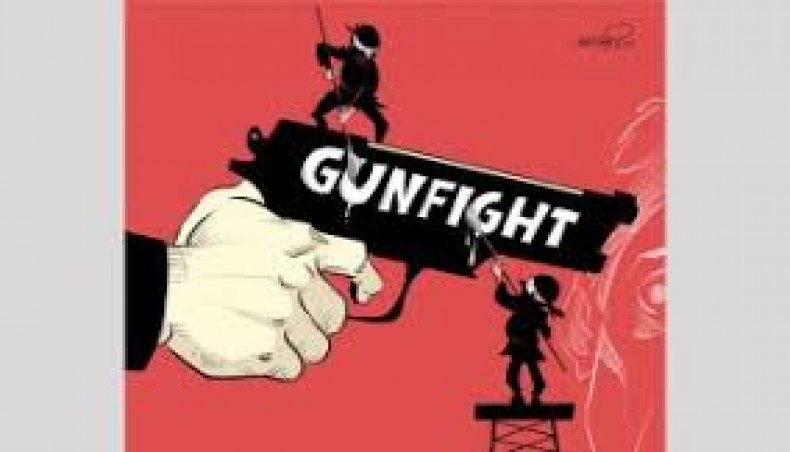EXTRAJUDICIAL KILLINGS Highest 422 in 10 months
The country witnessed the highest extrajudicial killings of 422 people either in custody or in reported ‘gunfight’ and ‘shootout’ in the past 10 months of 2018.
A report rights organisation Odhikar released on Friday showed that record 151 of the 422 extrajudicial killings occurred in May.
The report said, ‘Extrajudicial executions took a dangerous turn from May 15, 2018 during the nationwide anti-drug drives.’
Although the law enforcement agencies claimed that every victim was a illegal drug dealer, many families denied the allegation, it said.
‘The relatives of some victims said that the deceased were killed after they were picked up by members of law enforcement agencies,’ said the report.
The report revealed that 264 people were reported to have been killed extra-judicially in the name of ‘gunfight’ or ‘shootout’ during the ongoing ‘anti-drug drives’ across the country between May 15 and October 31, 2018.
‘While analysing the reasons behind the commissions of extrajudicial killings, it was found that such killings occurred to create fear — mostly in order to prevent the opposition and dissidents from mobilising or speaking; to resist so-called “extremists”; to stop all opposition under the pretext of “anti-drug operations”; or to protect perpetrators of offences by using law enforcement agencies against witnesses or others considered a “threat”,’ the report said.
According to Odhikar data, the number of victims of extrajudicial killings was 155 in 2017, 178 in 2016, 186 in 2015, 172 in 2014, 329 in 2013, 70 in 2012, 84 in 2011, 127 in 2010, 154 in 2009, 149 in 2008, 184 in 2007, 355 in 2006, 396 in 2005, 240 in 2004, 81 in 2003, 83 in 2002 and 44 in 2001.
Another rights organisation Ain o Salish Kendra data showed that 413 people were killed in the reported incidents of gunfights, crossfire, encounter or shooting by law enforcers and 15 of them were killed in custody in nine months between January and September in 2018.
The data showed that the number of people killed in such incidents was 162 in 2017, 195 in 2016, 192 in 2015 and 154 in 2014.
Rights activists alleged that such violation of human rights by law enforcement agencies continued to go unabated as the country lacked rule of law and the incidents were never investigated properly.
Home minister Asaduzzaman Khan on several occasions said that there was no extrajudicial killing in the country and that the deaths happened in gunfights.
Miscreants lock in gunfights with members of law enforcement agencies when the latter conduct drives to arrest the miscreants and recover illegal arms and ammunitions or drugs and the miscreants open fire on them, claimed the home minister.
The members of law enforcement agencies only open fire in self defence, he claimed.
He also claimed that each of the incidents was investigated and that a magistrate interrogated people concerned for a long time after every incident.
‘Extrajudicial killings continue due to absence of rule of law. Such killings cannot be happened in any civilised society,’ former adviser to caretaker government M Hafiz Uddin Khan told New Age Saturday.
Each of the incidents should be investigated independently and neutrally and the report should be published so that people can know what actually happened, he said.
It is not acceptable that extrajudicial killing would continue with the law enforcers coming up with the same stories, he said.
National Human Rights Commission chairman Kazi Reazul Hoque said that following newspaper reports, the commission sent letters to the home ministry on several occasions expressing concern and asking for investigation into the alleged extrajudicial killings.
He said that the ministry, after investigations into several incidents, responded that the allegations were not correct.
Extrajudicial killings go unabated while three High Court rulings on extrajudicial killings issued between 2006 and 2009 are yet to be disposed of.
The High Court first issued a ruling on extrajudicial killing on May 25, 2006.
In the ruling, the bench of Justice M Awlad Ali and Justice Zinat Ara asked the government to explain why the killing of Tunda Ismail, arrested in an arms case, remanded in police custody and killed in ‘crossfire’ while in fetters at Lalbagh on May 22, 2006, should not be properly investigated and the offenders should not be brought to justice.
The bench of Justice Syed Muhammad Dastagir Husain and Justice Mamnoon Rahman on August 6, 2006 issued a ruling asking the government and the Rapid Action Battalion to explain why they should not be directed to ensure the security of the people detained in their custody.
The court issued the order after hearing a writ petition filed by rights organisation Human Rights and Peace for Bangladesh, which sought the court’s directive on the government and the battalion to protect the life of anyone in detention from being killed in ‘crossfire’ or ‘encounter.’
The bench of Justice Syed Mahmud Hossain and Justice Quamrul Islam Siddiqui on June 28, 2009 asked the government to explain why extrajudicial killing by law enforcers in the name of ‘crossfire’ or ‘encounter’ would not be declared illegal.
On November 16, 2009, the bench of Justice AFM Abdur Rahman and Justice Md Emdadul Haque Azad issued a rule suo moto asking the government to explain extrajudicial killings within 48 hours.
News Courtesy: www.newagebd.net











